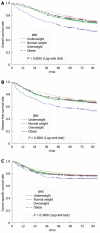Role of body mass index in colon cancer patients in Taiwan
- PMID: 22919253
- PMCID: PMC3422801
- DOI: 10.3748/wjg.v18.i31.4191
Role of body mass index in colon cancer patients in Taiwan
Abstract
Aim: To determine the effect of body mass index (BMI) on the characteristics and overall outcome of colon cancer in Taiwan.
Methods: From January 1995 to July 2003, 2138 patients with colon cancer were enrolled in this study. BMI categories (in kg/m²) were established according to the classification of the Department of Health of Taiwan. Postoperative morbidities and mortality, and survival analysis including overall survival (OS), disease-free survival (DFS), and cancer-specific survival (CSS) were compared across the BMI categories.
Results: There were 164 (7.7%) underweight (BMI < 18.5 kg/m²), 1109 (51.9%) normal-weight (BMI = 18.5-23.9 kg/m²), 550 (25.7%) overweight (BMI = 24.0-26.9 kg/m²), and 315 (14.7%) obese (BMI ≥ 27 kg/m²) patients. Being female, apparently anemic, hypoalbuminemic, and having body weight loss was more likely among underweight patients than among the other patients (P < 0.001). Underweight patients had higher mortality rate (P = 0.007) and lower OS (P < 0.001) and DFS (P = 0.002) than the other patients. OS and DFS did not differ significantly between normal-weight, overweight, and obese patients, while CSS did not differ significantly with the BMI category.
Conclusion: In Taiwan, BMI does not significantly affect colon-CSS. Underweight patients had a higher rate of surgical mortality and a worse OS and DFS than the other patients. Obesity does not predict a worse survival.
Keywords: Body mass index; Colon cancer; Morbidity; Outcome; Survival.
Figures
References
-
- Pischon T, Lahmann PH, Boeing H, Friedenreich C, Norat T, Tjønneland A, Halkjaer J, Overvad K, Clavel-Chapelon F, Boutron-Ruault MC, et al. Body size and risk of colon and rectal cancer in the European Prospective Investigation Into Cancer and Nutrition (EPIC) J Natl Cancer Inst. 2006;98:920–931. - PubMed
-
- Larsson SC, Wolk A. Obesity and colon and rectal cancer risk: a meta-analysis of prospective studies. Am J Clin Nutr. 2007;86:556–565. - PubMed
-
- Meyerhardt JA, Catalano PJ, Haller DG, Mayer RJ, Benson AB, Macdonald JS, Fuchs CS. Influence of body mass index on outcomes and treatment-related toxicity in patients with colon carcinoma. Cancer. 2003;98:484–495. - PubMed
-
- Dignam JJ, Polite BN, Yothers G, Raich P, Colangelo L, O’Connell MJ, Wolmark N. Body mass index and outcomes in patients who receive adjuvant chemotherapy for colon cancer. J Natl Cancer Inst. 2006;98:1647–1654. - PubMed
MeSH terms
LinkOut - more resources
Full Text Sources


